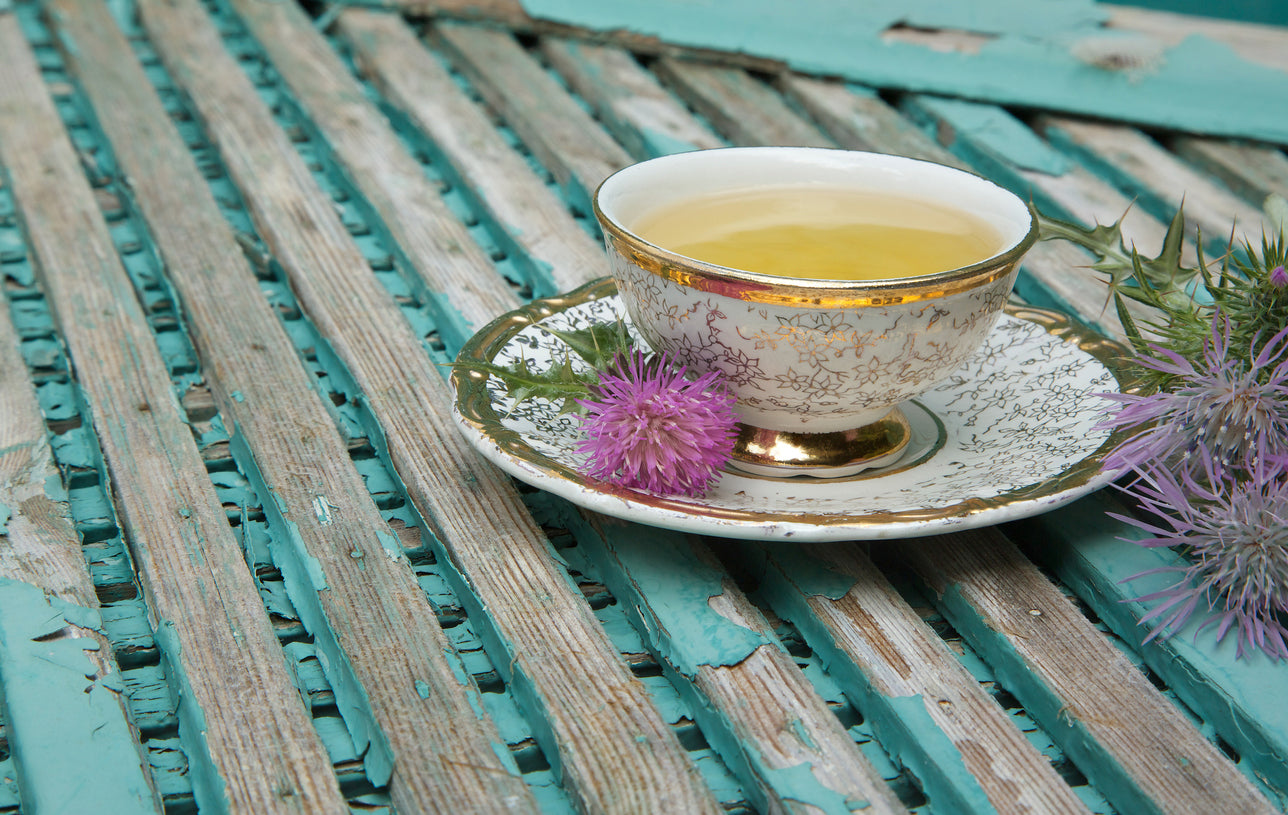Support a healthy liver with these herbs and nutrients

For many, liver health isn’t exactly “top of mind.” But, we neglect it at our own peril. Although the average liver weighs in at roughly three pounds, it’s no lightweight. The liver’s numerous duties include filtering impurities from the blood and neutralizing the countless threats to health - such as environmental toxins, harmful chemicals, viruses and bacteria - that besiege us on a daily basis.
The following nutrients can help nourish and cleanse the liver, allowing you to give this hard-working detoxifying organ some (much-deserved) support.
Milk thistle is the “gold standard” for herbal liver support
Milk thistle, botanically known as Silybum marianum, is considered the premier herbal compound for promoting liver health. The active constituent in milk thistle extract, a flavonoid known as silymarin, has powerful antioxidant, anti-inflammatory and detoxifying properties. Many scientists are “on board” with milk thistle’s benefits to the liver. In fact, a 2020 review published in Advances in Therapy suggested that silymarin protects the liver from oxidative damage, helps to repair and regenerate liver cells and promotes the production of glutathione, the body’s most important detoxifying enzyme.
The authors concluded that silymarin “consistently” demonstrated the ability to improve liver function in people with nonalcoholic fatty liver disease (NAFLD) - and may even protect against the liver scarring that accompanies advanced cases. To promote liver health, herbalists typically advise milk thistle extract in the amount of 50 mg to 300 mg a day. However, check with your integrative doctor before supplementing.
Glutathione is the body’s master detoxifier
Glutathione, which is produced naturally in the liver, has been termed “the mother of all antioxidants.” Not only does it battle toxins and pathogens and neutralize the free radicals that cause oxidative stress, but it recycles and replenishes other important antioxidants such as superoxide dismutase, vitamin C and vitamin E. (These compounds then “return the favor” by recycling glutathione.)
According to some natural health experts, so vital is glutathione that low levels are associated with virtually all chronic degenerative diseases, including cancer, heart disease and Alzheimer’s disease! Unfortunately, supplies of this liver-protecting molecule decline with normal aging. One of the best ways to ramp up levels is to eat foods that contain glutathione’s three “building blocks” - the amino acids cysteine, glycine and glutamine. This means eating healthy amounts of cruciferous vegetables - such as Brussels sprouts and cauliflower - and high-cysteine foods such as eggs, grass-fed beef and non-pasteurized, non-denatured whey protein.
Can you take supplementary glutathione? Yes, but some experts feel that oral glutathione is not efficiently absorbed by the body. (Pro tip: if you do opt for supplementation, liposomal glutathione is believed to be the most bioavailable formulation). Check with your integrative doctor before supplementing.
Dandelion greens are among the most liver-friendly foods on the planet
Although they have an alternate identity as a lawn weed, dandelions are actually a superfood. In a CDC-supported study conducted at the William Paterson University in New Jersey, researchers ranked dandelion greens as among the world’s healthiest foods offering impressive liver support. The greens’ diuretic properties allow them to flush and cleanse the liver, while an amino acid called kynurenic acid stimulates the release of bile and supports the health of the liver and gallbladder.
Dandelion greens are believed to suppress fat accumulation in the liver, with a study published in Food and Chemical Toxicology crediting dandelion leaf extract with helping to prevent and even reverse fatty liver disease. (Not too shabby for a common lawn pest!) Additional studies have shown that dandelion greens can help to protect the liver from toxic overload caused by medications such as acetaminophen. You can buy dandelion greens online or at your favorite health food store. Or, harvest your own - if you’re sure the area is free of pesticides (and bathroom visits by neighborhood pets). Dandelion green extract is also available, but first get the “go-ahead” from your integrative doctor.
Beetroot and beet juice help cleanse and protect the liver
Ruby-red beets pack a nutritional punch, offering up healthy amounts of the antioxidant vitamins A and C - along with minerals such as calcium, iron, magnesium and potassium. But their real “superpower” derives from their content of betalain, an antioxidant plant pigment believed to detoxify and protect the liver. For maximum benefit, many natural health experts recommend juicing raw beets (along with their greens), as cooking depletes betalain content. Beet juice is potent, so a little goes a long way. Experts advise starting out with no more than an ounce a week, then slowly increasing the amount to two ounces. (Pro tip: Beet juice pairs nicely with carrot, apple or celery juice).
You can give your liver a helping hand by minimizing your exposure to pesticides, processed foods and synthetic chemicals, while avoiding excessive use of alcohol and liver-damaging medications such as antibiotics and acetaminophen. (Of course, don’t stop taking prescribed medications unless your doctor directs you to. But do speak with them about the possibility of using more liver-friendly alternatives.) Maintaining a healthy weight can also promote a healthy liver.
Supporting liver health is one of the most important, pro-active steps you can take to safeguard your health. Here’s to a happy liver!
Sources for this article include:
-
Posted in
dandelion greens, glutathione, liver health, liver-cleansing herbs, silymarin






